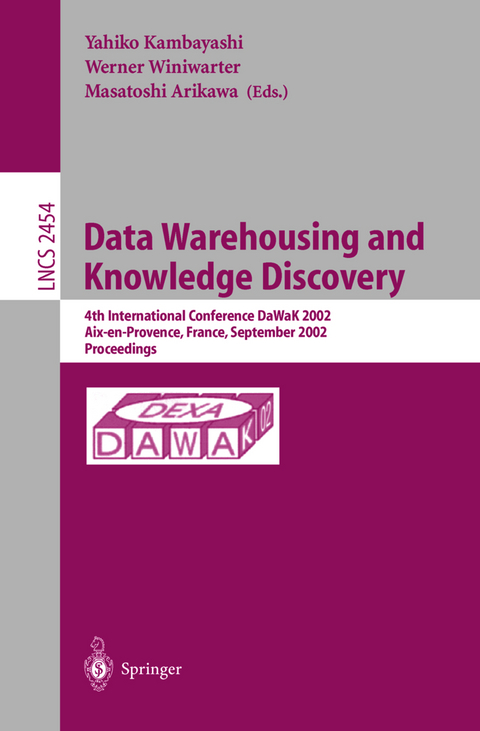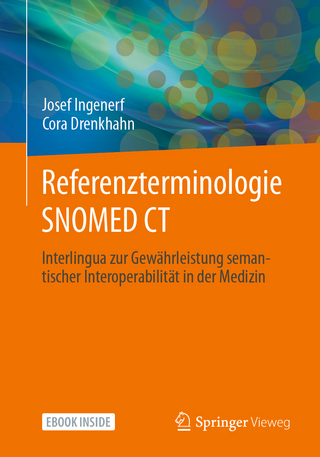
Data Warehousing and Knowledge Discovery
Springer Berlin (Verlag)
978-3-540-44123-6 (ISBN)
Association Rules.- A Comparison between Query Languages for the Extraction of Association Rules.- Learning from Dissociations*.- Mining Association Rules from XML Data.- Estimating Joint Probabilities from Marginal Ones*.- Clustering.- Self-Tuning Clustering: An Adaptive Clustering Method for Transaction Data.- CoFD: An Algorithm for Non-distance Based Clustering in High Dimensional Spaces*.- An Efficient K-Medoids-Based Algorithm Using Previous Medoid Index, Triangular Inequality Elimination Criteria, and Partial Distance Search.- Web Mining and Security.- A Hybrid Approach to Web Usage Mining.- Building and Exploiting Ad Hoc Concept Hierarchies for Web Log Analysis.- Authorization Based on Evidence and Trust*.- An Algorithm for Building User-Role Profiles in a Trust Environment1.- Data Mining Techniques.- Neural-Based Approaches for Improving the Accuracy of Decision Trees.- Approximate k-Closest-Pairs with Space Filling Curves.- Optimal Dimension Order: A Generic Technique for the Similarity Join.- Fast Discovery of Sequential Patterns by Memory Indexing.- Data Cleansing.- Dynamic Similarity for Fields with NULL Values.- Outlier Detection Using Replicator Neural Networks.- The Closed Keys Base of Frequent Itemsets.- Applications.- New Representation and Algorithm for Drawing RNA Structure with Pseudoknots*.- Boosting Naive Bayes for Claim Fraud Diagnosis.- Optimization of Association Word Knowledge Base through Genetic Algorithm.- Mining Temporal Patterns from Health Care Data*.- Data Warehouse Design.- Adding a Performance-Oriented Perspective to Data Warehouse Design.- Cost Modeling and Estimation for OLAP-XML Federations.- Constraint-Free Join Processing on Hyperlinked Web Data.- Focusing on Data Distribution in the WebD2W System.- OLAP.- A Decathlon in Multidimensional Modeling: Open Issues and Some Solutions.- Modeling and Imputation of Large Incomplete Multidimensional Datasets.- PartJoin:An Efficient Storage and Query Execution for Data Warehouses.- Data Warehouse Maintenance.- A Transactional Approach to Parallel Data Warehouse Maintenance.- Striving towards Near Real-Time Data Integration for Data Warehouses.- Time-Interval Sampling for Improved Estimations in Data Warehouses.
| Erscheint lt. Verlag | 14.8.2002 |
|---|---|
| Reihe/Serie | Lecture Notes in Computer Science |
| Zusatzinfo | XIII, 339 p. |
| Verlagsort | Berlin |
| Sprache | englisch |
| Maße | 155 x 235 mm |
| Gewicht | 508 g |
| Themenwelt | Informatik ► Theorie / Studium ► Algorithmen |
| Schlagworte | Association Rule Mining • Clustering • data cleansing • Data Mining • Data Security • Data Warehouse • Data-warehouse-Konzept • Data Warehouses • Data Warehousing • Discovery Science • Distributed Databases • Hardcover, Softcover / Informatik, EDV/Informatik • HC/Informatik, EDV/Informatik • Knowledge Discovery • LA • OLAP • On-Line Analytical Processing • service-oriented computing • temporal pattern mining • Warehousing • Web mining • XML |
| ISBN-10 | 3-540-44123-9 / 3540441239 |
| ISBN-13 | 978-3-540-44123-6 / 9783540441236 |
| Zustand | Neuware |
| Haben Sie eine Frage zum Produkt? |
aus dem Bereich


